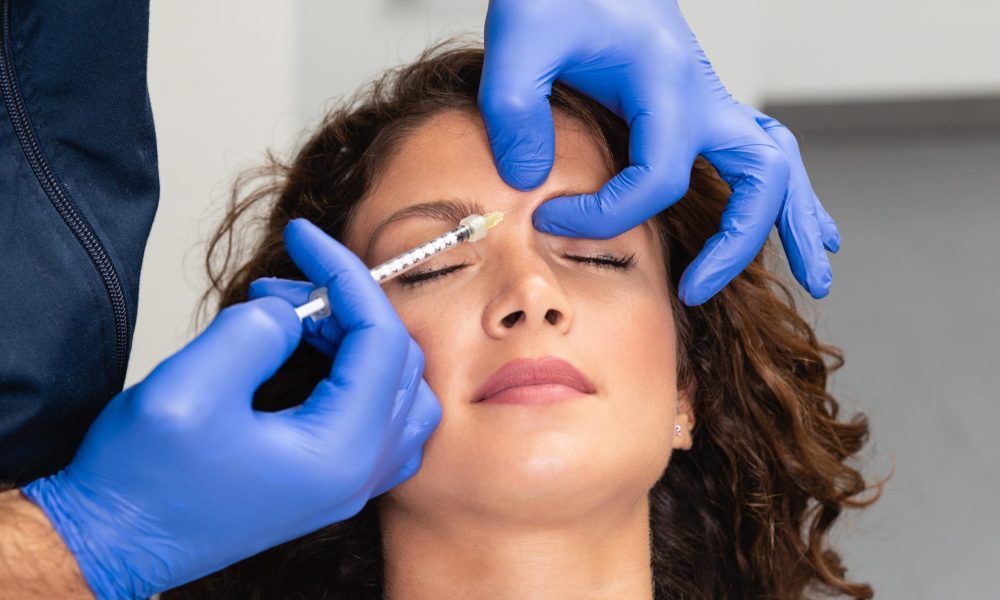

If you’re interested in cosmetic treatments, chances are you’ve heard of neurotoxins like Botox®, Dysport®, and Jeuveau®. These treatments have become incredibly popular in recent years thanks to their ability to smooth wrinkles, reduce muscle spasms, and even treat chronic migraines. But have you ever wondered how these neurotoxins work in the body?
In this blog post, we’ll explore neurotoxins’ effects on the nervous system, including their ability to improve various conditions, from excessive sweating to migraine headaches. Whether you’re considering neurotoxin treatments for the first time or simply curious about the science behind these powerful tools, keep reading to learn more!
Neurotoxins can damage or destroy nerve cells, leading to many adverse effects on the body. However, when used correctly and in the proper doses, some neurotoxins can also positively affect the nervous system.
Three neurotoxins are commonly used in cosmetic treatments: Botox®, Dysport®, and Jeuveau®.
Neurotoxins work by interfering with the normal functioning of nerve cells, which can have a range of effects on the body depending on the specific toxin and the affected area of the nervous system. In cosmetic treatments, neurotoxins reduce muscle activity and smooth out wrinkles and fine lines. Here’s a closer look at how neurotoxins work:
Mechanism of action: Acetylcholine, a neurotransmitter necessary for carrying nerve impulses from nerve cells to muscles, causes neurotoxins to act by preventing its release. When acetylcholine is released from nerve cells, it binds to receptors on muscle cells, causing the muscle to contract. By blocking the release of acetylcholine, neurotoxins prevent the muscle from receiving the nerve signal and thus reduce muscle activity.
Effects on nerve impulses and muscle contractions: Neurotoxins specifically target the junction between nerve cells and muscle cells called the neuromuscular junction. By blocking the release of acetylcholine at this junction, neurotoxins can reduce muscle contractions and smooth out wrinkles and fine lines. The effects of neurotoxins are temporary, typically lasting between 3 to 6 months, after which the body gradually breaks down and eliminates the toxin.
Role of acetylcholine in nerve transmission: Acetylcholine is a neurotransmitter released from nerve cells and binds to receptors on muscle cells, causing the muscle to contract. Without acetylcholine, the muscle cannot contract and remains relaxed. It is the basis for using neurotoxins in cosmetic treatments, as they block the release of acetylcholine and reduce muscle activity, resulting in a smoother appearance of the skin. However, it’s important to note that acetylcholine plays many other essential roles in the body, including regulating heart rate, digestion, and other bodily functions. Too much interference with its release can be dangerous.
While the primary use of neurotoxins is in cosmetic treatments, they also have several positive effects on the nervous system that can help treat various medical conditions. Here are some of the effects of neurotoxins:
Overall, the positive effects of neurotoxins on the nervous system highlight their potential as a versatile and practical treatment option for a range of medical conditions.
While neurotoxin treatments are generally considered safe, as with any medical procedure, there are potential risks and side effects to consider. Discussing these risks with a qualified provider before undergoing neurotoxin treatment is essential.
Some of the possible side effects and complications of neurotoxin treatments include:
Choosing a qualified and experienced provider like SkyRose Rejuvenation Clinic & Spa for your neurotoxin treatment is essential to minimize the risk of side effects. Our team is licensed and trained in administering neurotoxins and thoroughly understands facial anatomy and the nervous system.
Additionally, it is essential to inform us of any medical conditions or medications you are taking, as they may increase the risk of complications. We may also provide specific instructions to follow before and after treatment to minimize the risk of side effects. While neurotoxin treatments are generally safe and effective, it is essential to carefully consider the risks and benefits before undergoing any treatment.
Neurotoxins such as Botox®, Dysport®, and Jeuveau® have a range of positive effects on the nervous system, from reducing muscle spasms and chronic migraines to improving excessive sweating and treating overactive bladder. While these treatments have become well-known in the cosmetic industry for their anti-aging benefits, it is essential to remember their potential as a versatile and practical medical treatment option.
However, as with any medical procedure, choosing a qualified and experienced provider for your neurotoxin treatment is crucial to ensure your safety and the best possible outcome. Our SkyRose Rejuvenation Clinic & Spa team has the expertise and knowledge to provide safe and effective neurotoxin treatments with a commitment to personalized care and excellent results.
If you are considering neurotoxin treatment for any medical or cosmetic reason, contact us today to discuss your options and create a customized treatment plan tailored to your needs. We can work together to make you feel satisfied, healthier, and more confident.
Search
Recent Posts